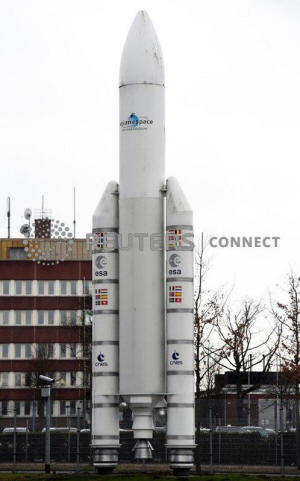|
Fly me to the moon: Germany eyes slice of
lucrative space market
 Send a link to a friend
Send a link to a friend
 [April 29, 2019]
By Andrea Shalal [April 29, 2019]
By Andrea Shalal
BERLIN Reuters) - Facing tough competition
from China, the United States and even tiny Luxembourg, Germany is
racing to draft new laws and attract private investment to secure a
slice of an emerging space market that could be worth $1 trillion a year
by the 2040s.
The drive to give Germany a bigger role in space comes as European,
Asian and U.S. companies stake out ground in an evolving segment that
promises contracts for everything from exploration to mining of
outer-space resources.
Firms likely to benefit from any future spending rise in Germany include
Airbus, which co-owns the maker of Europe's Ariane space rockets, and
Bremen-based OHB.
The new legislation would limit financial and legal liabilities of
private companies should accidents happen in orbit, set standards for
space operations and offer incentives for new projects, the German
economy ministry told Reuters.
The ministry's aerospace and space commissioner, Thomas Jarzombek, could
submit the laws to parliament later this year. The move comes as
companies and trade groups press for German authorities to establish a
regulatory framework for the lucrative new market to encourage private
investment.
"We are sounding the alarm that Germany and Europe are falling behind in
space vis-a-vis China and the United States," Dirk Hoke, defense and
space chief at Franco-German-led aerospace group Airbus, told Reuters.
"We're at a critical juncture to ensure we stay in the top league."

Germany is Europe's economic powerhouse and the world's fourth-largest
economy. However it had just the world's seventh-largest national space
budget in 2018, an estimated $1.1 billion, just over half the amount
generated by fifth-placed France, according to preliminary data from
Paris-based research firm Euroconsult.
The figure, which excludes contributions to pan-European programs, is
dwarfed by the United States - by far the largest spender on space at
almost $40 billion.
Ironically, American space ambitions could offer a lifeline.
Hoke said a new lunar Gateway program backed by U.S. space agency NASA
offered a chance for Germany and others in Europe to stake a claim to a
key role in the market.
"In my view, it is hugely important that we participate as equal
partners so that we are primed to develop and build technologies for
such a gateway," he said.
The program involves designing and developing a small spaceship that
will orbit the Moon and serve as a temporary home for astronauts and as
a base for work on the moon's surface and, later, missions to Mars. NASA
had aimed to finish the Gateway by 2026, but Washington is now aiming to
put humans back on the Moon by 2024, which could lead to an accelerated
schedule.
Even before then, Germany is facing a brain-drain as companies worldwide
ponder how to extract minerals from asteroids and water from the moon
within a decade.
Some companies are already considering moving to Luxembourg, which has
taken a lead in Europe by enacting laws to limit liabilities and ease
restrictions on mining operations. It has also set up a 100-million-euro
($112 million)investment fund for projects.
"It's a global market. We have our customers and we will keep them, even
if we have to run the company from somewhere else," said Walter
Ballheimer, CEO of German Orbital Systems, a Berlin-based start-up that
builds small satellites.

"Germany was overtaken a long time ago," he said. "But it's not too
late. If they are courageous enough and adopt a clear space policy ...
then we can still have a piece of the cake that we should have as a
leading export nation."
Two other heads of small German space companies told Reuters they were
considering leaving the country.
'LEAN' SPACE LAW
But Germany is not standing still.
Space commissioner Jarzombek is working with trade groups, companies and
other experts to draft the space laws, and plans to submit it them
parliament sometime after September.
"We are aiming for a lean basic law that is open to the future," said a
spokeswoman for Jarzombek and the economy ministry. "A national space
law should focus above all on incentives and make it possible for the
German space industry to play a bigger role in global developments."
[to top of second column]
|

A model of Ariane Group's Ariane 5 rocket is pictured at the Airbus
plant in Bremen, Germany, February 19, 2019. Picture taken February
19,2019. REUTERS/Fabian Bimmer

Berlin is also pressing the United Nations to set standards for
mining of the Moon, asteroids and other objects in space.
The United States passed a law in 2015 that encouraged private
companies to undertake mining work beyond Earth, and gives its firms
the right to claim resources they may one day be able to extract
from celestial bodies.
Jarzombek helped secure a 269-million-euro increase in planned
funding for the European Space Agency (ESA) in 2020-2023. But
Germany's total space funding, which includes ESA and national
programs, is not expected to rise in that period. It edged slightly
lower to 1.57 billion euros in 2019.
The 18-member ESA oversees cooperation on space exploration and
launches, but individual countries have their own research and
interests, funded outside the ESA budget.
Matthias Wachter, aerospace expert at the BDI German Federation of
Industry, said advances in space were crucial for future
technologies such as autonomous driving.
"Germany is limping behind," he said.
Any spending plans would have to contend with rising budget
pressures and an economic slowdown. Germany is in its 10th year of
expansion, but only narrowly avoided recession last year.
Senior executives from Deutsche Bank and Munich Re and others met in
Berlin this month to brainstorm ways to fund and insure new space
projects.
One problem is Germany's conservative approach to investment and
financing as entrepreneurs seek capital, said Sebastian Straube, CEO
of investment firm Interstellar Ventures.

Straube is building a 100-million-euro investment fund that will
fund projects. He is also working with companies like rail operator
Deutsche Bahn to encourage them to support new ventures that build
applications taking advantage of increased access to space through
satellites in low-earth orbit.
SPACEX BATTLE
Marco Fuchs, CEO of satellite builder OHB, said Germany needed
bigger increases in national space funding to pay for pioneering
developments, citing growing competition worldwide.
The company carried out a privately funded commercial mission with
China to orbit the moon in 2014, and teamed up this year with Israel
Aerospace Industries to offer the commercial delivery of payloads to
the lunar surface for ESA.
OHB is a key player in the battle between Europe's new Ariane 6
rocket and the Falcon 9 built by Elon Musk's SpaceX to launch the
first of two new OHB spy satellites, called Georg, for Germany's
foreign intelligence agency in 2022.
The contract, worth tens of millions of dollars, is drawing
political attention after SpaceX and Ariane traded barbs about
access to each other's markets, which could presage a transatlantic
trade dispute in coming years.
OHB and the German government are expected to select the winner by
late 2020, and Fuchs said the decision would be based on many
factors, including launch dates and available budgets.
"In the end, it's always a question of the price - or a political
decision," he said.
(Additional reporting by Andreas Rinke and Tim Hepher; Editing by
Pravin Char)
[© 2019 Thomson Reuters. All rights
reserved.]
Copyright 2019 Reuters. All rights reserved. This material may not be published,
broadcast, rewritten or redistributed.
Thompson Reuters is solely responsible for this content.
 |